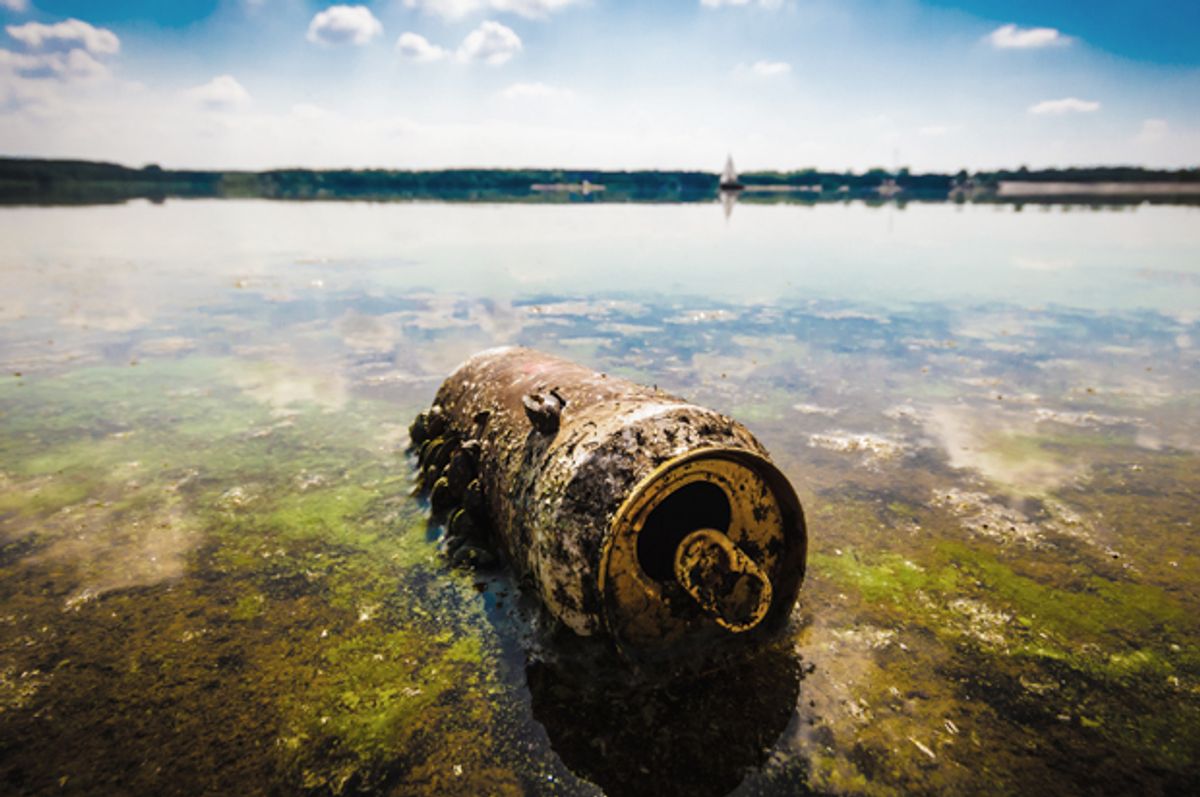Low-income communities have long had complicated relationships with their government-regulated water systems. As Grist’s Brentin Mock reported last month, city governments’ denial of public swimming sites to black residents resulted in dozens of drownings every summer in New Orleans, Washington, D.C., and other segregated neighborhoods nationwide during the mid-20th century. In 2010, the Root’s Katti Gray noted that, of the 1.6 million Americans currently living without access to complete indoor plumbing and/or clean running water, “more than 1 percent of blacks in Mississippi, Louisiana, Georgia, South Carolina and Virginia [...] The urban poor in substandard housing also lack water.” And we needn’t look too far into our nation’s history to recall the bodies floating atop the Hurricane Katrina floodwaters in 2005. Of the more than 1,400 who perished, two-thirds drowned or died while trapped by surrounding water-- a crisis that could have been avoided entirely if the flood walls and levees first reported as compromised in 1965 had been properly repaired.
Historically, the denial of access to water and the lack of protection from it have spelled calamity and fatality for communities of color, especially those where poverty is disproportionately high.
This week, as Detroit’s months-long water cutoffs to thousands of residents become national news, we are once again confronted with a public health and safety hazard that could have potentially deadly results for black, brown and low-income families.
According to the Detroit Water and Sewerage Department, residential and commercial customers who are in arrears on their water bills owe about $118 million. The department has been cutting off water to 3,000 delinquent accounts per week since March 2014. When the cutoffs are completed, an estimated 150,806 residences and businesses will be left without water, just under half of the department’s 323,900 total accounts.
The Detroit Free Press reports that struggling low-income families account for some of the delinquencies, and Mia Cupp of the Wayne Metropolitan Community Action Agency told the Press, “There are families that have gone months and months without water.” Though Detroit area unemployment has decreased since last year, it’s still higher than the national average at 9.7 percent. The cost of water bills in Detroit is also higher. Nationally, the average water bill is about $40. Residents are currently expected to pay $75 per month and will soon be responsible for paying an 8.7 percent increase.
What’s worse is the city’s reason for the drastic spike: an outsize, aging water system in desperate need of repair.
This isn't just a tale of unfortunate extremes. It isn't something we can turn into some pat morality play about the importance of timely bill payment. This is an act of systemic violence.
As part of its Chapter 9 bankruptcy filing last year, the City of Detroit cited poor record-keeping and misallocation of social program funds as part of the reason the city was unable to strike a payment agreement with its many creditors for just 10 percent of the total debt.
How then can the city demand that individual account holders satisfy 30 to 50 percent of their water bill arrears before they can even enter a payment plan agreement? How can the city expect the half of its consumer base that is most economically depressed to pay close to $100 a month for running water? How can it ask those who can afford the steep price hike to supplement the debt of the citizens the city itself is willing to abandon?
As thousands of families continue to lose water, their entire communities will be affected. Lack of access to clean water supplies will result in an inability to maintain basic hygiene, properly prepare meals, or protect the infants, children and elderly from the spread of diseases to which they would be most susceptible.
The number of citizens affected by mass water cutoffs points to much larger factors than personal responsibility, and yet Detroit Water and Sewerage hopes that personal responsibility and the efforts of nonprofit organizations will mitigate a crisis for which the city itself is responsible.
And yet, Detroit’s storied indomitable spirit continues to prevail. This Friday, June 27, the Water Access Volunteer Effort (WAVE) Fund will host its annual WAVE on the Water Gala and allocate proceeds to its fund that aids in securing safe drinking water and sanitation services for low-income families in crisis. The Wayne Metropolitan Community Action Agency recently raised $148,000 in a charity walk. And a coalition of activist groups in the city have even petitioned the United Nations High Commission for Human Rights for outside assistance.
Affected communities are proving they will not go quietly into widespread water-related peril. But they are in a race against the clock. As history assures us, if the city, its citizens and this nation don’t act quickly to resolve this crisis, the water we’re rallying to procure may be compromised by the dilapidated system delivering it. A formerly gleaming hub of national automotive advancement, Detroit deserves so much better than this. In America, a nation that should be able to regulate protection from preventable water crises, we all do.



Shares